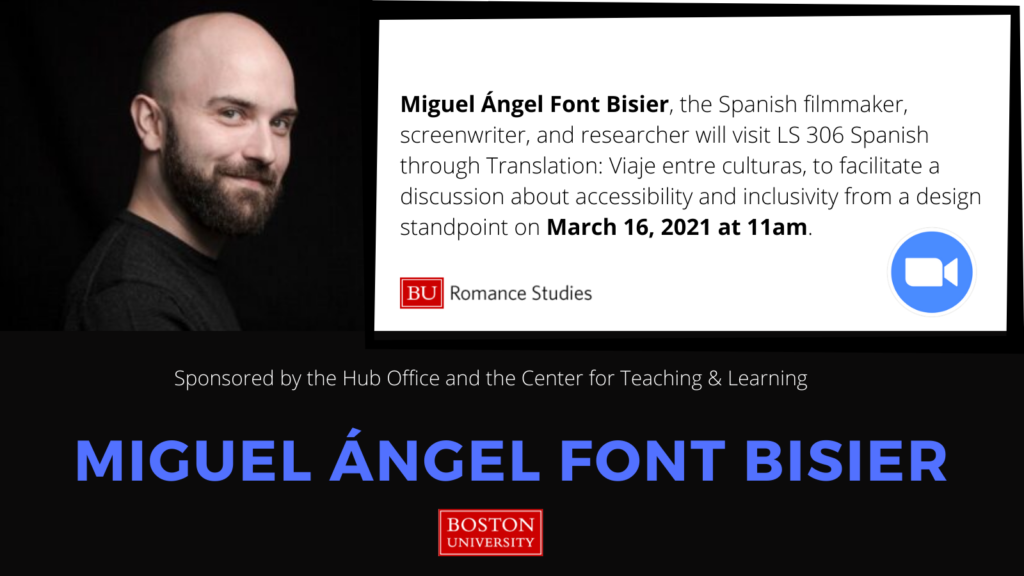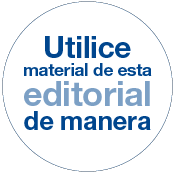Contributed by Elena Carrión Guerrero (Senior Lecturer, Spanish, Department of Romance Studies, CAS, at the Boston University).
1 – Introduction
«In my spring class, LS 306 Spanish through Translation, I was fortunate to receive a grant from the Hub Course Enhancement fund to invite Miguel Ángel Font Bisier, the Spanish filmmaker, screenwriter, and researcher, to speak with my students about accessibility and inclusivity in film-making.

The conversation, entirely conducted in Spanish between my students and our speaker, was extremely inspiring. Miguel Ángel initiated his presentation, engaging the students from the very beginning, by asking them why there was still so much to work on to achieve inclusion in our society. He then presented the different models we live in (traditional, hybrid, or inclusive) drawing on different examples not just pertaining to the cultural world, but also to the fields that students are majoring in.
Miguel Ángel continued on, explaining all the details that should be taken into account when creating an inclusive film, from having an inclusive team, to offering a sensorial experience to people with visual impairment, to reflecting on how to write a script by anticipating what would be needed later for closed captioning or audio description, and making sure to create a more accessible final piece. One example regarding a cultural aspect he described was in the vocabulary used for closed captioning so the target audience would better understand the word “chip” and not “implant,” as the latter word is associated to cochlear implants for the deaf/hard of hearing community, and that was not the topic of the film.

2 – Students’ feedback
Students congratulated him on having an inclusive team where people with disabilities were a part of the movie-making process. They participated by asking questions, for example: the difference between designing an inclusive movie from the beginning or modifying it later, whether the costs differed, if the filmmaker watched his movies with his eyes closed to review the audio-description, how the pandemic had affected him, or how he wrote the audio descriptions.
Students were particularly struck by the level of detail he gave when sharing numerous examples of how he made decisions to select the wardrobe (aligned with the closed caption colors), adapting the speech to fit the Spanish closed captions (as space tends to be an issue in Spanish) but without losing the message, or selecting ASL interpreters that were similar to the actors. Furthermore, he asked for feedback from the community in order to fix any mistakes they might have made in the production.

In my students ́ reflections, one of them wrote, “It was fascinating to hear these things because when I heard them they seemed obvious but I had never stopped to think about them.” Miguel Ángel reminded us “not to do anything without the intended target audience one wants to create accessibility for, as this audience will be the one that gives us the most valuable feedback.”
3 Final thoughts
Having Miguel Ángel as an invited speaker, in a course where students’ attention to detail in transferring messages from English into Spanish, open to a universal design approach, proved to be a treasured experience. This talk deepened into a reflection on how each individual can be a part of creating a more inclusive, and therefore, empathetic, society, regardless of their scope of interest. As Miguel Ángel stated: “Inclusion does not only improve art, but also our own lives.”
Time flew by in the class, and a common theme in my students’ reflections was how there are many people that need access to the world, but they had never stopped to reflect on this.

This was a great opportunity to support the HUB areas of Global Citizenship & Intercultural Literacy and Oral and/or Signed Communication. If you are interested in learning more about Miguel Ángel Font Bisier’s work, I recommend watching the following videos: Creando Cine Inclusivo (2019) Cortometraje documental (English closed captioned); Evento Inclusivo: Premiere Oficial XMILE en los Cines Lys de Valencia (vídeo accesible) (English closed captioned); Recording of his presentation on March 16 (in Spanish)».
You may find the original article here.








